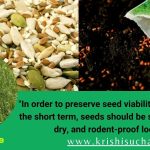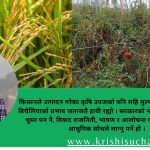GMOs and Hybrid seeds in Nepal

The quality of seed owing to its relationships with the genetic traits primarily determines the crop quality and productivity . Various diverse opportunities in seed dynamics with the desirable traits through hybridization and genetic modification has brought revolution in agriculture.
GMOs :
GMOs are microorganisms , plants and animals that have had their genes altered to produce a desired effect . GM crop is a plant into which one or more genes have been artificially inserted instead of the plants acquiring them natural conditions of cross- breeding or natural recombination . Eg . But corn is an example of Gm crop . Usually they are modified either to further scientific research or to alter the food supply. Common genetic modifications include; cloning of both animals and plants, injecting growth hormones in animals, adding antibacterial genes to plants, introducing genes that make organisms bigger or hardier, and making new foods by mixing genes from existing ones. GM crop is a plant into which one or more genes have been artificially inserted instead of the plant acquiring them natural conditions of cross-breeding or natural recombination.
Advantages of GMOs Seeds :
- GMOs inserted in crops helps to protect the crop against pest and insects. For ex. The Bt gene is commonly genetically inserted into crops like corn, cotton and soybeans.
- GMOs crops develop capacity to survive stressful conditions such as drought and resist diseases like blights , resulting in higher yield for farmers.
- The genetic modification in crops helps to increase the nutritional value of foods. For eg. Rice high in beta carotene also called golden rice. It is also used to enhance the flavor and appearance of foods such as non be owning apples.
- The GMOs seeds benefits in agriculture helps to increase the crop yields and also helps to reduce cost for food or drug production.
GMOs stages in Nepal :
The global demand of GMO crops is increasing nowadays.
However, in case of Nepal, formally, no GM crops/seeds are registered, introduced and grown so far.
Recently issue has been raised by civil society, media and farmers’ right based organizations regarding GMOs and terminator seeds. Terminator technology is not allowed in Nepal as per provision of national policy/legislation. Whereas, Nepal is very infant stage in GM crop testing, quality control and development of legislation.
Research can be done with the permission from authorized agency but government can ban import and research on any GMOs with potential risk to alter diversity and negative impact on health and environment. The two provisions in regard of GMOs are as follows:
1.National Agro Biodiversity Policy, 2063. It has provision on receiving permission from authorized agency to conduct research on Genetically Modified Organisms and government can ban import and research on any GMO with potential risk to alter diversity and negative impact on environment.
2.National Biosafety Framework, 2063. It authorizes the concerned agencies for regulatory measures and guidelines to avoid or minimize potential risks of GMO plant & their products, GMOs microorganism & their products and GMO animals and their products.
In case of seed, no any GM seeds are registered and introduced in Nepal so far. GMO laboratory under SQCC carries out detection test on seeds of maize and soybean every year for imported samples collected from border districts by using PCR technique. In 2067/68 five varieties of imported hybrid maize seed samples (India) were collected from Nepalgunj, Bhairhwa, Butwal and Janakpur tested by using Cry 1Ab/Bt11 event kit through lateral flow stripe test method for GMO, found negative. Similarly five imported samples (China) of soybean were collected and tested by using Envirolog ix-RUR- Round Up Ready Event lateral flow stripe test also, found negative for GMO. The decisions whether introduce or not GM seeds in Nepal shall be made based on evaluation of biosafety report submitted by the party or produced by concerned sectoral competent authority.
Although , the global area of GM crops is increasing Nepal is at very infant stage in GM crop testing , quality control and development of legislation . Research can be done with the permission from authorized agency but government can ban import and research on any GMOs with potential risk to alter diversity and negative impact on health and environment
Hybrid Seeds:
Those seeds which are produced through hybridization techniques by cross- pollinated crops are called hybrid seeds . they are open pollinated seeds results from a simple sharing of pollen between two like parent plants.
Advantages of Hybrid seeds :
1.The hybrid seeds are easier and faster to grow and to get yield .
2. Hybrid seeds enhances the yield of crop . Hybrid seeds can have up to 25% higher yield .
3. The hybrid seeds tend to offer better and consistent performance which helps to perform different agricultural operations like weeding , harvesting efficiently .
4. The hybrid seeds are much stronger and larger plants .
5. The hybrid seeds promotes in the development of new species of flowers and vegetables .
Hybrid Seeds stages in Nepal :
In Nepal the use of Hybrid seeds is common in vegetables , maize and rice . A large number of imported hybrids in vegetables are being popular in Nepal . A hybrid variety in tomato ( Srijana ) was registered in 2010 . Most of the seeds of commercial vegetables are imported from foreign countries like Thailand , China , Korea , Japan and India . Although , more than 30 foreign countries are supplying hybrid seeds , still there is a huge gab between the demand and supply of hybrid vegetable seeds in Nepal .
Since 1980, hybrid maize seed marketing was started by open border between India and Nepal . About 7000 ha area was allocated for hybrid maize seed production in Chitwan , Bara , Rautahat ,Sarlahi , Kavre . Nawalparasi , Rupendehi and dang districts under maize mission programmed run by DoA .The high yielding ability by 15 – 25 % as compared to open pollinated varieties has lead to an increasing trend in use of hybrid seeds among farmers . The first hybrid varieties in Nepal was officially released in maize (Gaurav) in 2004 ; but it could not remain for long time . National seed board has released another new variety of maize ‘Rampur Hybrid -2’ and many varieties are also in pipeline . Hybrids in maize and rice are also increasingly being popular .
Since 1980, hybrid maize seed marketing was started by open border between India and Nepal . About 7000 ha area was allocated for hybrid maize seed production in Chitwan , Bara , Rautahat ,Sarlahi , Kavre . Nawalparasi , Rupendehi and dang districts under maize mission programme run by DoA .
Research in Hybrid development is being initiated in maize and Vegetables by National Maize research programme and In Horticulture Research division , NARC , respectively .Despite the high demand of hybrids, research in hybrid variety development is limited in Nepal due lack of trained human resources, infrastructure and investment by both public and private sectors. Seed vision2025, envisaged that 20 hybrids comprising, 10 in vegetables, 6 in maize and 4 in rice will be developed and promoted to meet the increased domestic demand and import substitution in public sector. In addition, 40 hybrids comprising 20 in vegetables, 10 in maize and 10 in rice are expected to be developed and promoted by private sector.
Conclusion:
As the population is growing and the productivity of crops is decreasing due to various environmental disorderness , Hybrid and GMOs are the alternative ways to prevent the Nepal from food insecurity. To make country self sufficient in hybrid seeds research activities should be promoted rapidly and Government should allocate budget and should give priority for the production of the hybrid seeds in the country .
Writer: Shobha Pokhrel (Student, Bsc. Ag, IAAS, Paklihawa Campus)

 एउटा यस्तो विषालु भ्यागुता, जसको मुल्य नै पर्छ ३ लाख, जान्नुहाेस्
एउटा यस्तो विषालु भ्यागुता, जसको मुल्य नै पर्छ ३ लाख, जान्नुहाेस्  भोलि र पर्सि बालबालिकालाई भिटामिन ए खुवाइदै
भोलि र पर्सि बालबालिकालाई भिटामिन ए खुवाइदै  खगराज अधिकारी गण्डकीको मुख्यमन्त्री नियुक्त
खगराज अधिकारी गण्डकीको मुख्यमन्त्री नियुक्त  सुनसरीमा दुवै पक्षबीच सहमति, कर्फ्यु खुकुलो हुदै
सुनसरीमा दुवै पक्षबीच सहमति, कर्फ्यु खुकुलो हुदै  स्टेफेनको शतकमा आयरल्याण्ड वोल्भ्सले नेपाल ए लाई दियो २८५ रनको लक्ष्य
स्टेफेनको शतकमा आयरल्याण्ड वोल्भ्सले नेपाल ए लाई दियो २८५ रनको लक्ष्य 


